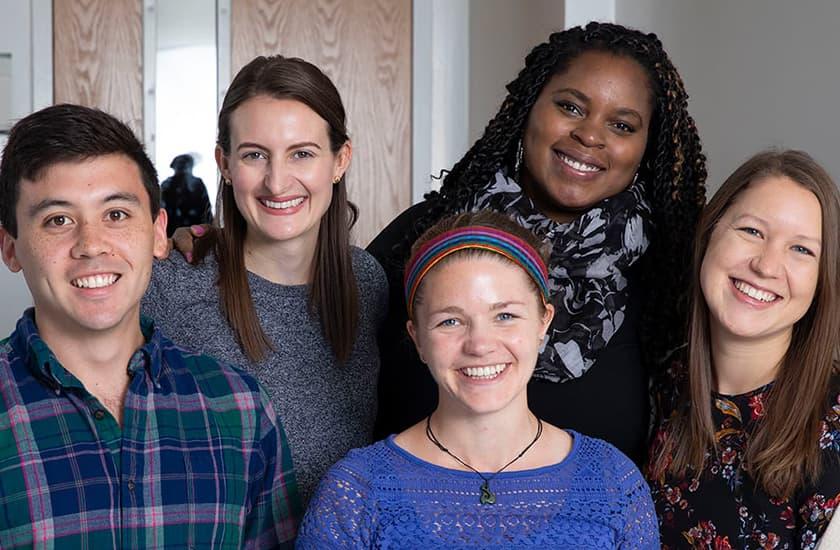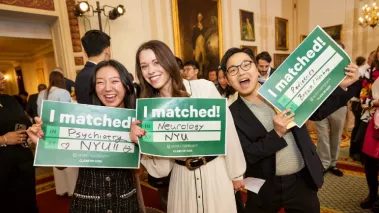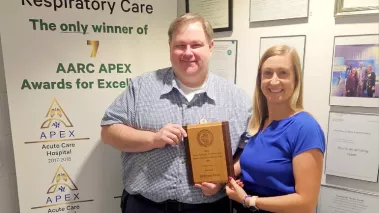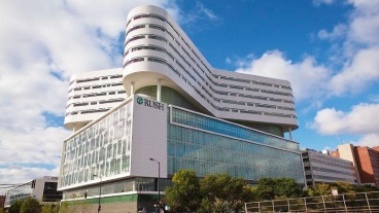A group of five tightly knit, newly minted Rush Medical College graduates said their goodbyes at commencement in April as each one got set to venture across the country for residency training. The lessons they learned together during a recent trip abroad as part of their year-four elective formed a bond that will last a lifetime while also helping them bond with patients to provide the best health care possible.
Facilitated in part by Rush's Office of Global Health, a service-learning stint in Guatemala for Emily Kelly, Annalisa Morgan, Emma Richardson, Valerie Rock and Alexander Sun improved their ability to provide health care for, and communicate with, Spanish-speaking patients. Members of the group recently talked about the experience and how it will make them better physicians.
Tell us about your trip.
Annalisa Morgan: We traveled to Guatemala through a medical Spanish immersion program that counted as class credit. Rush’s Office of Global Health helped cover some of the tuition, which was a big help.
Emily Kelly: We were there four weeks starting in late January, and we all lived with different homestay families. One of the things that made the trip unique is there is a Spanish language program within a health clinic. On weekday mornings, we would spend a couple of hours practicing at the clinic. We also had lectures on cultural competency — topics like health care in Guatemala, local governmental issues and the history of the region. And in the afternoons we all had four hours of one-on-one Spanish lessons.
In the evening there was usually some kind of cultural activity, whether it was watching a movie in Spanish or learning how to make traditional Guatemalan food. On the weekends we had time to be tourists.
The program also involved a lot of other community projects, including one called the Stove Project. Part of our tuition went toward buying material to build stoves for local families in rural areas, enabling families to cook inside their homes in a way so the smoke can escape outside. It helps with a lot of the respiratory problems there.
What was your motivation for taking the trip?
Valerie Rock: My residency will be in family medicine, and I am interested in working with the urban underserved, particularly with communities of color. What I noticed during my experience working at Cook County Hospital is the language barriers that sometimes exist in providing primary care. So, being on the frontline of primary care as a family medicine doctor, it is really important for me to develop language skills, particularly Spanish, because many of my patients will be Spanish speaking. The trip to Guatemala really helped me build on my existing Spanish skills.
Alexander Sun: The program also used to have a relationship with local midwives in the area, and I have an interest in obstetrical care. We weren't able to participate directly with the midwives, but we were able to learn through our conferences and through the other doctors that we worked with about the prenatal care in the country and how expecting mothers in Guatemala receive their health care. In rural settings, child deliveries are mostly attended to by a traditional midwife who really doesn't have a formal education but is dealing with complicated deliveries.
Annalisa: Like Valerie, a big component of why I chose to go was I wanted to strengthen my medical Spanish because I found that when I worked at Cook County, 90 percent of my patients were Spanish speaking. So I really wanted to be able to strengthen my relationship with those patients. It was really interesting to learn about health care in a different country, because we do things so differently in the United States.
Emily: I had very similar goals. I knew going into my fourth year as a medical student that I wanted to go abroad and learn Spanish, which is the No. 2 language in the U.S. It's so important to be able to connect with a patient in their language. I wanted to learn enough Spanish to at least be able to say “hi,” explain who I am and that I would be back soon with a translator. On top of that, we were able to work on community service projects, so we weren't just tourists — we were able to give back to the community.
What was the most fulfilling part of the trip?
Emily: Getting to know my homestay family. My host grandmother and the whole family was just so lovely and welcoming. It was really hard to communicate just how grateful I was at first, but my Spanish improved so much. I was really surprised by how much I learned due to being immersed in the language.
Alex: It was also rewarding to see our improvement in the clinic from the beginning of the program to the end. We weren't really able to participate all that much the first few days — just listening and observing. But by the fourth week, we were all able to conduct an uncomplicated clinic visit in Spanish and communicate well with the patient.
Annalisa: Like Emily, I had almost no Spanish skills, so being able to go from sluggishly making your way through a conversation to now being able to have full conversations was really rewarding. And in the clinic, all of the patients and doctors are just so grateful for you being there to take the time to listen to them and to help them. I can't even tell you how many hugs we would get in clinic from patients!
Valerie: The media sometimes paints a picture of Central America and immigration that is really unfair. It's not totally representative of the diversity and the character of the people from these areas. Going to Guatemala and learning about the struggles, perseverance and strength of the Guatemalan people was really humbling and provided a perspective that I was not getting from the media back home. When I reflect on my experience and on the patients that I serve in the future, the importance of cultural competency really stands out.
What would you tell students who might be considering a global health trip?
Valerie: Just do it! I said to myself, “When will I ever have this opportunity again in the near future?” I wanted to say yes to the wonderful opportunities that are available now while I have the time to actually enjoy them. So if you’re on the fence, talk to an adviser and go for it. But make sure you’re prepared mentally for some of the difficulties that will come up during the travel experience.
Alex: Yes! It's time consuming to prepare, but it's definitely worth it considering what you take out of it clinically while also seeing a whole new world.
Annalisa: You're tired after residency interview season, so up until the week before I left, I was like, “Am I really doing this? Am I really going to go to Guatemala?” Getting ready for it is a lot of work. But I'm so glad I went because it was one of the best months in my medical school experience, and I wouldn't change it for the world.
Emily: We’re all committed to jobs next year, so there won’t be a ton of opportunities to take off and live in a different place for a month. I have gotten a couple emails already from third-year students asking how they can do this next year. You have to be OK being flexible. You have to be OK being uncomfortable. Getting around takes work. Wi-Fi is limited. But those experiences make you stronger and make for really great stories later.







